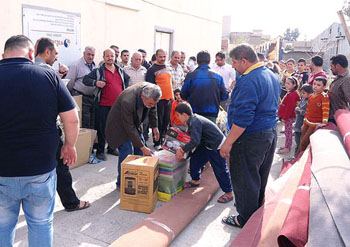By Mark Ellis

A year ago, ISIS fighters attacked civilians in the historic Nineveh region of Iraq. At least 200,000 civilians, most of them Yazidis, were forced to flee for their lives.
The Yazidis’ beliefs are rooted in Zoroastrianism, mixed with elements of Christianity and Islam. Many fled to Erbil and Dohuk, which allowed Christian ministries aiding refugees in those areas to reach a people group that previously had been inaccessible.
One Yazidi religious leader, whose name is withheld for security reasons, was suspicious of Christian aid given to Yazidis through an indigenous Christian group along with the gospel message, according to a report by Christian Aid Mission.
“He didn’t like us helping people or entering their homes to evangelize, and he reported us to the local security police to stop our operations in the area he lives in,” said the director of the Iraqi aid group, whose name is withheld for security purposes.
“We were asked by the local police to stop, and we did.”
Soon after that, the Yazidi leader got sick. His fellow Yazidis told him that many of them who had gotten sick had been healed after Christians came to pray for them.
“He asked for us to pray for him, and we did, and the Lord healed him the same week, after he thought he was dying,” the director reported to Christian Aid.
“The last time we were there, he was standing surrounded by all his followers and telling everyone about how Jesus healed him, and after I gave a speech to the group and did an invitation to Christ, we counted 136 people who surrendered their lives to Christ.”
With assistance from Christian Aid Mission, the indigenous ministry in Iraq this year began visiting sick refugees with a large van equipped as a mobile medical clinic. Three volunteer doctors, five volunteer nurses, five church members, one psychologist and one dentist have served 2,500 refugees – about 50 to 80 per day.
Another refugee from the Yazidi community was on the verge of death due to lack of medicine for his diabetes, the ministry director said. The mobile medical van personnel found him just in time.
“We provided insulin for him, which made his condition completely stable, and after we presented Christ to him, he expressed great interest and accepted the Lord Jesus,” he said.
The Yazidi’s wife, daughters and their husbands also put their faith in Christ, he added.
“It was not that easy, because he had to face the big challenges of the family and the Yazidi clergy, but this person expressed his faith and was bold about it,” he said.
While some religious and political leaders have felt threatened by Christianity since its origin, Christian Aid Mission’s Middle East director said the ministries cannot be blamed for exploitation.
“Christian ministries in Iraq exploit Yazidis in the same way that firemen exploit people in burning buildings,” he said. “If we want to place blame for Yazidis turning to Christ, I think we can blame the Holy Spirit. God’s Spirit is giving them an interest – the Yazidis are asking for New Testaments and the gospel. These are not being forced on them.”
ISIS attacks have displaced Yazidis, Muslims who do not pledge allegiance to the ISIS caliphate, Kurds and, lately, people who have fled Al Anbar Province, the ministry director said. Among Muslims, nine of every10 the ministry encounters will listen with interest, he said.
“In one way or another,” he said, “we have served about 35,000 people with food and clothes, blankets and heaters, the mobile medical clinic, one-to-one evangelism, speaking to a group of people, praying with them, giving them Bibles and literature or inviting them to church.”
To make a gift to help indigenous missionaries meet needs in Iraq, go here




Comments are closed.